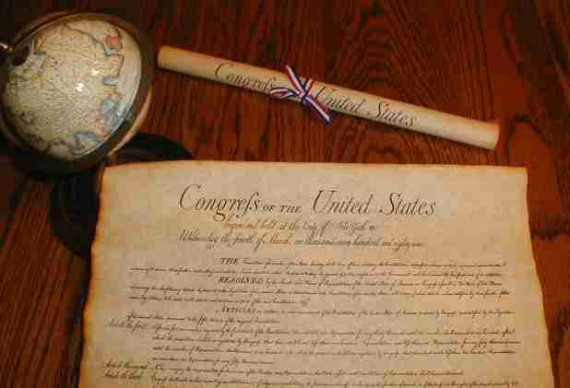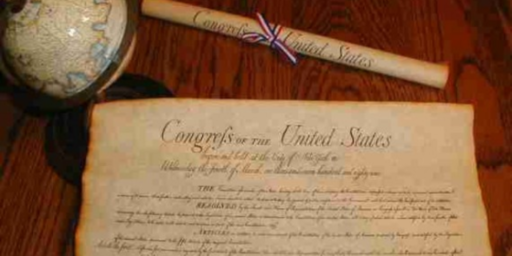Federal Appeals Court Rules Warrant Required To Track Cell Phone Location
Should the police be able to track you without a warrant? One Federal Appeals Court says no.
A Federal Appeals Court in Atlanta has ruled that police must obtain a search warrant before accessing the information necessary to track a person’s location via their cell phone:
A federal appeals court has for the first time ruled that a warrant is required for the government to obtain an individual’s stored cellphone location records.
The Thursday decision by a three-judge panel in the U.S. Court of Appeals for the 11th Circuit in Atlanta contrasts with a July 2013 decision by another appeals court that a warrant is not required.
That circuit court split increases the likelihood that the issue — one of the most pressing in privacy concerns in the digital age — will be settled by the Supreme Court.
“We hold that cell site location information is within the subscriber’s reasonable expectation of privacy,” the panel wrote in its decision. “The obtaining of that data without a warrant is a Fourth Amendment violation.”
In this case, a criminal defendant named Quartavious Davis appealed a 2012 conviction for robbery and conspiracy in part on grounds that the cellphone tower records were obtained on a court order using a lesser legal standard than a warrant
Rather than “probable cause,” prosecutors needed to show only that there were “reasonable grounds to believe” that the records sought were “relevant and material” to a criminal investigation.
The panel upheld Davis’s conviction, however, ruling that the officers “acted in good faith reliance” on the court order issued by a magistrate judge.
Cell tower location records were used to place Davis and five others near the scenes of several robberies, including at a restaurant, a gas station and a drug store.
The government argued that historical cellphone tower data is less precise and less invasive than data from phones with GPS technology and therefore deserves less protection than a warrant.
“That information obtained by an invasion of privacy may not be entirely precise does not change the calculus as to whether obtaining it was in fact an invasion of privacy,” the court wrote.
“The appeals court’s opinion is a resounding defense of the Fourth Amendment’s continuing vitality in the digital age,” said American Civil Liberties Union Staff Attorney Nathan Freed Wessler, who argued the cellphone issues before the panel in April. “It puts police on notice that when they want to enlist people’s cellphones as tracking devices, they must get a warrant from a judge based on probable cause” that the records will provide evidence of a crime.
As a preliminary matter, it’s important to note that the issues in this case are distinctly different from those at stake in the two cases pending before the Supreme Court which will likely be decided by the end of this month. In those cases, the Court is dealing with the question of whether, and to what extent, police are permitted to examine the data stored on a cell phone or smartphone without obtaining a search warrant as required by the Fourth Amendment, and the standards that ought to be applied by trial courts and magistrates in issuing warrants in those situations. In this case we are dealing with the question of whether or not there is a reasonable expectation of privacy in the location of our cell phones or smart phones to the extent that law enforcement ought to be required to obtain a warrant to access this information. In that sense, it is similar, though not identical to a case that was before the Supreme Court last year which dealt with a situation in which police had attached at GPS tracking device to a suspects car without obtaining a warrant. In that case, the Court ultimately ruled that a warrant should have been requested in that case, but the opinion was so divided that it provides little guidance on the overarching issue of when location information, whether it is obtained via an independent tracking device or via phone, is protected by the Fourth Amendment to the extent that a warrant would be required.
The 11th Circuit isn’t the first court to deal with this issue, of course. Last July, the Fifth Circuit Court of Appeals ruled that the same sort of tracking at issue in this case did not require a search warrant. Several days later, though, the New Jersey Supreme Court ruled that such a search did in fact require a search warrant. Similar cases raising this issue raising this issue are pending in Courts around the nation, and they are only likely to increase given how ubiquitous location tracking technology has become and the well-founded supposition that a person is most likely located in the same location that his cell phone is located. That, combined with the fact that we now have a circuit split on this issue make it likely that this is an issue that will end up before the Supreme Court, perhaps as soon as the term that begins in October.
As for the opinion itself, Orin Kerr at The Volokh Conspiracy has some criticisms:
In the court’s view, obtaining cell site information triggers the Fourth Amendment even more readily than does obtaining GPS information attached to a car. A car’s location is public location as long as it’s not in a garage. According to the court, that’s why you need to get to a mosaic of many data points about the location of the car before the information crosses the line from public to private under the mosaic theory ofMaynard. You don’t need that with cell-site information, the court reasons. Because even a single data point could reveal something private about you, obtaining even a single cell-site record can violate your reasonable expectation of privacy and therefore becomes a Fourth Amendment “search.”
What about Smith v. Maryland, on which the Fifth Circuit based its contrary opinion? The Eleventh Circuit finds that Smith is “not without persuasive force.” But Smith does not apply, the court holds, because most people don’t know that their cell phones can act as tracking devices. Because most people don’t think their phones can reveal their location, they have a reasonable expectation of privacy in their cell-site data even though their phones must reveal location to the cellular provider to work. Thus individuals don’t knowingly disclose their cell-site records to their cellular providers under Smith v. Maryland because they don’t know how phones work. (Here the Eleventh Circuit relies heavily on dicta from a Third Circuit decision that I blogged about here.
Next, the court rules that the government nonetheless wins by extending the good-faith exception to the exclusionary rule articulated in United States v. Leon. Under Supreme Court’s decision in Leon, the exclusionary rule does not apply to good-faith reliance on a defective search warrant. There was no warrant in this case. But the Eleventh Circuit find this distinction “semantic,” as there was a court order under 18 U.S.C. 2703(d). So the exclusionary rule doesn’t apply, and the cell-site records were properly admitted.
(…)
[O]n the merits, I think the Eleventh Circuit’s analysis is based on a misunderstanding of Fourth Amendment law. The Eleventh Circuit’s argument seems to be based on the idea that some facts are inherently private. Recall this passage:
While committing a crime is certainly not within a legitimate expectation of privacy, if the cell site location data could place him near those scenes, it could place him near any other scene. There
is a reasonable privacy interest in being near the home of a lover, or a dispensary of medication, or a place of worship, or a house of ill repute.
So according to the Eleventh Circuit, if the government learns that you’re committing a crime, that’s okay. But if they learn that you’re near a church, then that’s a search. I gather this is coming from intuitions about stuff that is none of the government’s business. It’s good for the police to know someone is committing a crime. We like that. On the other hand, the government has no business knowing if an innocent person is near a lover’s home.
But there’s a reason the court cites no cases for this idea: As far as I know, there are none. The Fourth Amendment does not declare certain facts to be inherently protected by the Fourth Amendment regardless of how they are obtained. What matters is how the government learns those facts, not the facts themselves
Kerr’s criticisms of the Eleventh Circuit decision are well-founded, and he’s certainly better versed on this subject than I am, but it strikes me that what we’re really seeing yet another example of how the Fourth Amendment rules that the Supreme Court set down in Smith v. Maryland simply don’t make sense in the modern world. That case was decided in 1979 when something like a portable phone that nearly everyone would carry and which would be capable of being tracked based on both radio signals and a geosynchronous network of satellites was barely even conceivable. The Supreme Court held in that case that the installation of a pen register, a device capable of tracking all the numbers called by a particular telephone that is installed at a telephone company switch station rather than anywhere on the property of a potential suspect is not a search within the meaning of the Fourth Amendment, thus meaning that police do not need to get a search warrant in order to have such a device installed. However, as Kerr himself notes in an analysis of an opinion last year that found several NSA tracking programs unconstitutional, the world is a very different place today. As I noted at the time, there are many good reasons why cases such as this should lead to a reconsideration of the holding in Smith v. Maryland:
In this case, though, the Judge is essentially arguing that the expectation of privacy that average Americans have regarding their phones and the data associated with that phone has changed significantly since the Supreme Court dealt with the issue in 1979. Given the prevalence of services that operate in the “cloud” today, there’s an argument in favor of Judge Leon’s argument that shouldn’t be easily dismissed. Why should it matter for Fourth Amendment purposes, for example, if someone stories their email on their hard drive, which clearly would require police to obtain a warrant to gain access to, and whether they store it on the servers of Google, Microsoft, or any of there other online email services? With specific regard to the metadata in these case, there would also seem to be a good argument in favor of the argument that individuals have a reasonable expectation of privacy in the phone call and other data associated with their use of their cell phone or smart phone. After all, today that metadata includes not just a record of calls and received and made, but also data relating to text messages, web sites visited, financial transactions, meetings and other information stored on a calendar app like the one provided by Google, messages and posts on social media sites, including messages intended to be private, and other such information. These phones, in other words, have become an extension of people’s private lives to the point where the law needs to re-examine the question of what constitutes a “reasonable expectation of privacy” in the modern world. By issuing this decision, Judge Leon has essentially challenged his superiors to re-examine the Smith case in the light of how much he world has changed in the last thirty-four years.
The same reasoning would seem to apply in cases such as this, and it ties into the GPS surveillance case that was before the Supreme Court last year, for reasons that Ninth Circuit Court of Appeals Judge Alex Kozinski made clear in his dissent from the Court’s decision to deny an en banc hearing before that case went to the Supreme Court:
By tracking and recording the movements of millions of individuals the government can use computers to detect patterns and develop suspicions. It can also learn a great deal about us because where we go says much about who we are. Are Winston and Julia’s cell phones together near a hotel a bit too often? Was Syme’s OnStar near an STD clinic? Were Jones, Aaronson and Rutherford at that protest outside the White House? The FBI need no longer deploy agents to infiltrate groups it considers subversive; it can figure out where he groups hold meetings and ask the phone company for a list of cell phones near those locations.
The panel holds that the government can obtain this information without implicating the Fourth Amendment because an individual has no reasonable expectation of privacy in his movements through public spaces where he might be observed by an actual or hypothetical observer. But that’s quite a leap from what the Supreme Court actually held in Knotts, which is that you have no expectation of privacy as against police who are conducting visual surveillance, albeit “augmenting the sensory faculties bestowed upon them at birth with such enhancements as science and technology afford[s] them.” 460 U.S. at 282. You can preserve your anonymity from prying eyes, even in public, by traveling at night, through heavy traffic, in crowds, by using a circuitous route, disguising your appearance, passing in and out of buildings and being careful not to be followed. But there’s no hiding from the all-seeing network of GPS satellites that hover overhead, which never sleep, never blink, never get confused and never lose attention. Nor is there respite from the dense network of cell towers that honeycomb the inhabited United States. Acting together these two technologies alone can provide law enforcement with a swift, efficient, silent, invisible and cheap way of tracking the movements of virtually anyone and everyone they choose. See, e.g., GPS Mini Tracker with Cell Phone Assist Tracker, http://www.spyville.com/passive-gps.html (last visited July 17, 2010). Most targets won’t know they need to disguise their movements or turn off their cell phones because they’ll have no reason to suspect that Big Brother is watching them.
I don’t think that most people in the United States would agree with the panel that someone who leaves his car parked in his driveway outside the door of his home invites people to crawl under it and attach a device that will track the vehicle’s every movement and transmit that information to total strangers. There is something creepy and un-American about such clandestine and underhanded behavior. To those of us who have lived under a totalitarian regime, there is an eerie feeling of déjà vu. This case, if any, deserves the comprehensive, mature and diverse consideration that an en banc panel can provide. We are taking a giant leap into the unknown, and the consequences for ourselves and our children may be dire and irreversible. Some day, soon, we may wake up and find we’re living in Oceania.
Similarly, the idea that the police should be able, without first establishing to a Judge or Magistrate, that they have probable cause to believe that there may be criminal activity going on, to track people’s movements by accessing their cell phone records or tuning into their phone’s GPS signal is one that would likely strike most Americans as completely foreign. The abuses that could result from such a world would seem to be rather obvious, and the ability of law enforcement to, for example, use such information to intimidate a potential witness into incriminating someone are rather obvious. In the end, the burden of having to go to a court and prove that there is a good reason to do something like this is so minimal that it strikes me as antithetical to everything the 4th Amendment stands for to not require law enforcement to do so.
Here’s the 11th Circuit’s opinion:







This is the same Supreme Court that thought that there was no such thing as corrupt politics when they shot down Montana’s challenge to Citizens United. Don’t underestimate the power of a stupid idea when certain factions want it.